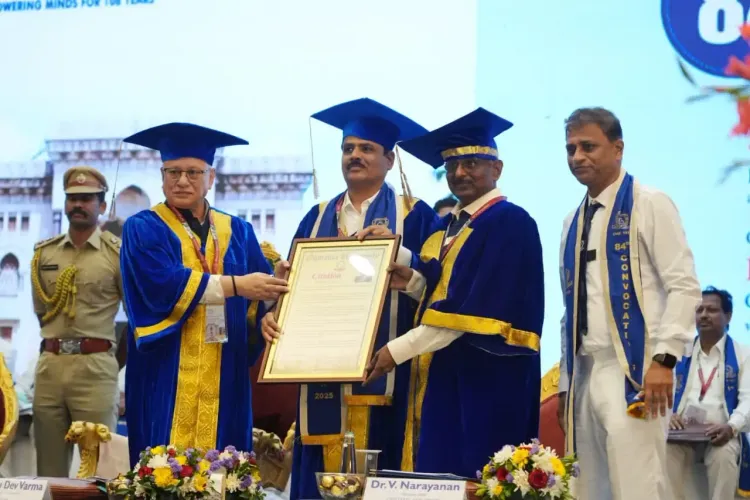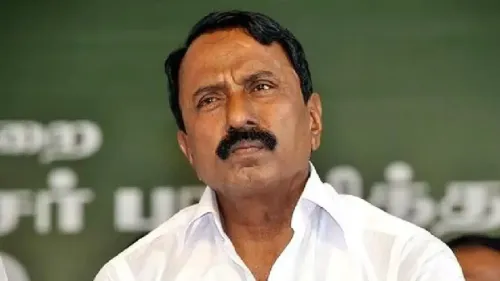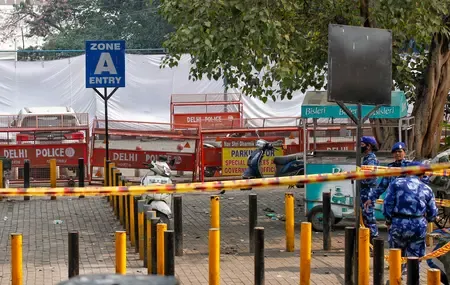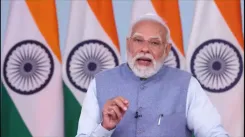Is ISRO Developing a 40-Storey Tall Rocket to Launch a 75,000 kg Satellite?

Synopsis
Key Takeaways
- ISRO is creating a rocket as tall as a 40-storey building.
- The new rocket will enable the launch of a 75,000 kg satellite into low Earth orbit.
- India plans to establish a space station by 2035.
- ISRO has ambitious plans to triple its satellite count in the next few years.
- The Aditya L1 satellite is a significant achievement in solar research.
Hyderabad, Aug 19 (NationPress) The Indian Space Research Organisation (ISRO) is developing a rocket towering at the height of a 40-storey building to place a 75,000 kg satellite into low Earth orbit, as stated by ISRO Chairman V Narayanan on Tuesday.
The space agency has set ambitious targets, including the launch of the NAVIC (Navigation with India Constellation System) satellite and the N1 rocket, in addition to sending a 6,500 kg communication satellite for the US into orbit using Indian launch vehicles.
During his convocation address at Osmania University, Narayanan expressed, "We are envisioning a rocket designed to place 75,000 kg into low Earth orbit. This rocket will reach the height of a 40-storey building." He reflected on the initial launcher developed by Dr. APJ Abdul Kalam decades ago, which had a 17-tonne lift-off mass and could transport only 35 kg into low Earth orbit.
He disclosed that ISRO plans to launch a Technology Demonstration Satellite (TDS) this year, along with GSAT-7R, a military communication satellite tailored for the Indian Navy, which will replace the current GSAT-7 (Rukmini) satellite.
With 55 satellites presently in orbit, the ISRO Chairman noted that this number is expected to triple within the next three to four years.
As announced by Prime Minister Narendra Modi, India aims to establish its own space station by 2035, weighing 52 tonnes. The agency is also progressing on the Venus Orbiter mission.
Discussing astronaut Shubhanshu Shukla’s successful journey to the International Space Station, he recounted how the mission was initially set for June 11, but was postponed to June 25 due to a leak identified by his team.
"We insisted on rectifying the issue. Having worked in this field for 40 years, I understand the potential hazards of a rocket launching with a leak. Upon inspection, a crack was found that could have led to catastrophic failure. Thanks to the diligence of our Indian team, we achieved a safe mission, not just for Shubhanshu Shukla but also for three international astronauts," he remarked.
Elaborating on India's space journey, Narayanan emphasized that India is now positioned alongside leading space-faring nations.
From modest beginnings with a small rocket donated by the US in 1963, the space program has evolved significantly. Recently, ISRO celebrated a successful launch of the NASA-ISRO Synthetic Aperture Radar satellite.
"An essential payload valued at 10,300 crore was constructed by the US, while an equivalent payload was built entirely by Indians in India. The rocket that lifted it off was also an Indian creation, successfully placing it in orbit," he stated.
In three months, ISRO will undertake another significant mission, launching a 6,500 kg communication satellite built by the US using an Indian launcher on a commercial basis.
He highlighted that India has successfully launched 133 satellites of various categories, including a 6,000 kg high-throughput GSAT-11 satellite, and has deployed 433 satellites for 43 countries using its own launch vehicles.
India boasts the best camera on the Moon, achieving a 32-centimetre resolution, and remains the only country to have successfully completed its Mars orbiter mission on the first attempt when developed nations could not.
"ISRO is the first organization, and India the first country, to successfully launch 104 satellites with a single rocket on the first attempt. Today, we have developed the Aditya L1 satellite to study the Sun," Narayanan stated.
Not only is it designed for solar study, but it has also gathered 20 terabits of data. India is one of only four nations capable of constructing satellites for solar research, he added.
Narayanan received an honorary Doctorate of Science degree in recognition of his vital contributions to India’s space program from Telangana Governor Jishnu Dev Varma.









